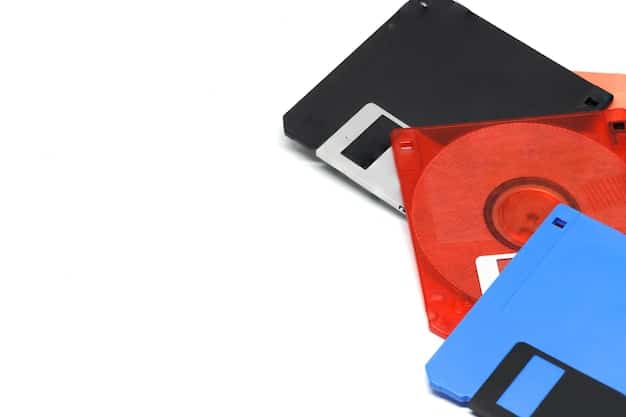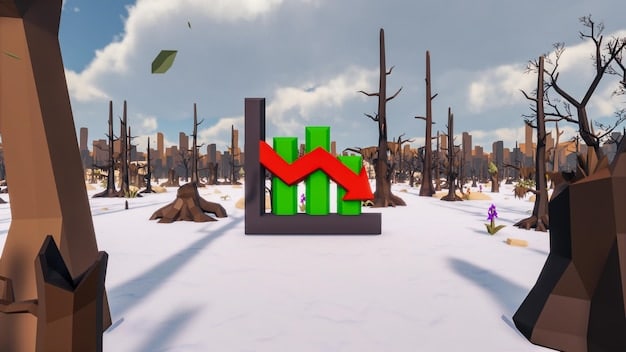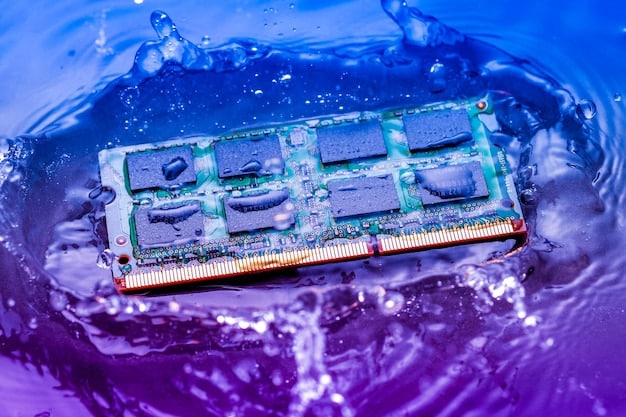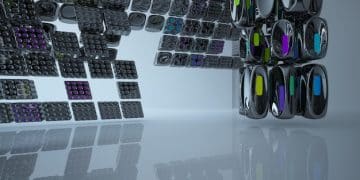PC Gaming Storage: SSD vs HDD vs NVMe – 2025 Guide

Navigating the world of PC gaming storage can be tricky; this guide clarifies your options—SSD, HDD, and NVMe—to optimize your gaming setup in 2025.
Choosing the right PC Gaming Storage Solutions: SSD vs. HDD vs. NVMe – Which is Right for You in 2025? can dramatically impact your gaming experience. Let’s explore the options to find the perfect fit.
Understanding Your PC Gaming Storage Needs
Before diving into the specifics of each type of storage, it’s crucial to understand what makes a storage solution ideal for PC gaming. Speed, capacity, and budget are the primary considerations.
The Importance of Storage Speed
Faster storage speeds translate to quicker game load times, reduced stuttering, and smoother overall gameplay. This is especially critical for modern AAA titles with massive open worlds and high-resolution textures.
While HDDs (Hard Disk Drives) were the standard for years, they are now significantly slower compared to SSDs (Solid State Drives) and NVMe (Non-Volatile Memory Express) drives. However, they still offer large capacities at lower prices.
Capacity Considerations for Gamers
Modern games often require 50GB to 100GB of storage space, and this demand is only increasing. Consider not just your current game library but also future releases and other storage needs like videos, music, and documents.
A good starting point for a gaming PC is a 1TB drive, but a 2TB or larger drive might be necessary for avid gamers with extensive libraries. Balancing capacity with speed is key to a satisfying gaming experience.

- Speed Matters: Faster load times improve the overall gaming experience.
- Capacity is Key: Modern games require significant storage space.
- Budget Considerations: Balance performance with affordability.
Ultimately, understanding your specific needs in terms of speed, capacity, and budget will help you make an informed decision about the best storage solution for your gaming PC.
SSD: The Solid State Revolution for Gamers
SSDs have revolutionized the storage landscape by offering significantly faster speeds and improved reliability compared to traditional HDDs. They have become a staple in modern gaming PCs.
How SSDs Enhance Gaming Performance
SSDs use flash memory to store data, which allows for much faster read and write speeds compared to the mechanical nature of HDDs. This results in quicker boot times, faster game loading, and snappier system responsiveness.
SATA vs. NVMe SSDs: Understanding the Difference
While all SSDs offer performance improvements over HDDs, there are different types of SSDs with varying levels of performance. SATA SSDs use the older SATA interface, while NVMe SSDs use the much faster PCIe interface.
SATA SSDs are generally more affordable and offer a good balance of speed and price, making them a popular choice for gamers on a budget. NVMe SSDs, on the other hand, offer significantly faster speeds, but come at a higher price point.
Advantages and Disadvantages of SSDs
SSDs offer numerous advantages, including faster speeds, improved durability, and lower power consumption. However, they are generally more expensive than HDDs and may have lower capacities.
The advantages of using an SSD for gaming far outweigh the disadvantages, especially when considering the improved gaming experience. However, budget and capacity constraints may influence the decision.

- Faster Load Times: Reduce waiting and increase gaming enjoyment.
- Improved Responsiveness: Experience smoother gameplay and system performance.
- Greater Durability: SSDs are more resistant to physical damage compared to HDDs.
In summary, SSDs offer a significant upgrade over HDDs for gaming, providing faster speeds and improved reliability. Deciding between SATA and NVMe SSDs depends on budget and performance requirements.
HDD: The Traditional Workhorse for Storage
HDDs have been the standard in storage for decades, offering large capacities at relatively low prices. While they are slower than SSDs, they still have a place in modern gaming PCs.
Why HDDs Remain Relevant in 2025
Despite the rise of SSDs, HDDs remain relevant due to their affordability and high storage capacities. They are ideal for storing large game libraries, media files, and other data that don’t require fast access speeds.
Understanding HDD Performance Limitations
HDDs use spinning platters and a moving read/write head to access data, which is inherently slower than the flash memory used in SSDs. This results in longer load times and slower system responsiveness.
Best Use Cases for HDDs in a Gaming PC
In a gaming PC, HDDs are best used for storing less frequently played games, large media files, and backups. They can complement a smaller, faster SSD used for the operating system and frequently played games.
Consider using an HDD as a secondary drive for bulk storage while relying on an SSD for the core gaming experience. This approach balances cost and performance effectively.
While HDDs cannot match the speed of SSDs, their large capacities and lower prices make them a viable option for gamers who need to store vast amounts of data. Understanding their limitations and best use cases is essential.
NVMe: The Speed Champion for PC Gaming
NVMe drives represent the cutting edge of storage technology, offering unparalleled speeds and performance for demanding applications like PC gaming. They are the fastest type of storage currently available.
The Advantages of NVMe over SATA SSDs and HDDs
NVMe drives utilize the PCIe interface, which provides much higher bandwidth compared to the SATA interface used by traditional SSDs. This results in significantly faster read and write speeds, leading to quicker load times and smoother gameplay.
NVMe drives are particularly beneficial for open-world games and applications that require fast access to large amounts of data. They provide a noticeable improvement in overall system responsiveness.
NVMe Installation and Compatibility Considerations
NVMe drives typically come in the M.2 form factor and connect directly to the motherboard. Ensure that your motherboard supports NVMe drives and has an available M.2 slot.
Also, consider the PCIe generation supported by your motherboard and the NVMe drive. Newer PCIe generations offer even faster speeds, so matching the drive and motherboard capabilities is essential.
Are NVMe Drives Worth the Investment for Gaming?
While NVMe drives are more expensive than SATA SSDs and HDDs, the performance benefits can be significant, especially for demanding gamers. If budget allows, an NVMe drive is a worthwhile investment.
However, for casual gamers or those on a tight budget, a SATA SSD may provide a more cost-effective solution. Evaluate your gaming needs and budget to determine if an NVMe drive is right for you.
In conclusion, NVMe drives offer the fastest storage speeds available, making them an ideal choice for serious PC gamers. Consider compatibility, installation, and budget when deciding if an NVMe drive is the right choice.
Optimizing Your Storage Setup for 2025 Gaming
Regardless of the type of storage you choose, optimizing your setup is essential for maximizing performance and ensuring a smooth gaming experience. Proper configuration can significantly enhance your system’s capabilities.
Best Practices for Installing and Configuring Storage Devices
Ensure that your storage devices are properly installed and configured in the BIOS. Verify that the drives are recognized and set to the correct boot order. Also, install the latest drivers for optimal performance.
For NVMe drives, make sure they are connected to a PCIe slot that provides the full bandwidth supported by the drive. Avoid using shared PCIe lanes, as this can limit performance.
Utilizing Caching and Tiered Storage Solutions
Consider using caching solutions or tiered storage setups to improve performance. Caching involves using a small, fast drive (like an NVMe SSD) to store frequently accessed data from a larger, slower drive (like an HDD).
Tiered storage solutions automatically move frequently accessed files to faster storage and less frequently accessed files to slower storage, optimizing performance without manual intervention.
Regular Maintenance and Optimization Tips
Perform regular maintenance tasks like defragmenting HDDs (not SSDs), running disk cleanup, and checking for errors. Also, keep your operating system and drivers up to date.
- Proper Installation: Ensure drives are correctly installed and recognized.
- Caching Solutions: Use caching to improve access speeds.
- Regular Maintenance: Keep your system optimized with routine tasks.
By following these best practices, you can optimize your storage setup for peak performance and ensure a smooth gaming experience in 2025. Proper configuration is key to unlocking the full potential of your storage devices.
Future Trends in PC Gaming Storage
As technology continues to evolve, the future of PC gaming storage promises even faster speeds, larger capacities, and more innovative solutions. Staying informed about these trends is essential for gamers looking to stay ahead of the curve.
Anticipated Advancements in SSD and NVMe Technology
Expect to see continued advancements in SSD and NVMe technology, including faster read and write speeds, higher capacities, and lower prices. New flash memory technologies like QLC (Quad-Level Cell) will enable even more affordable high-capacity drives.
Additionally, look for improvements in NVMe controllers and interfaces, such as PCIe 5.0 and beyond, which will further increase bandwidth and reduce latency.
The Potential Impact of New Storage Technologies on Gaming
New storage technologies will have a significant impact on gaming, enabling faster loading times, smoother gameplay, and more immersive experiences. Games will be able to stream assets more quickly, reducing stuttering and improving overall performance.
Expect to see games designed with these faster storage technologies in mind, taking full advantage of their capabilities to deliver unparalleled gaming experiences.
- Faster Speeds: Future storage will offer even quicker loading times.
- Higher Capacities: More storage space at lower prices.
- Innovative Solutions: New technologies will enhance gaming experiences.
In summary, the future of PC gaming storage is bright, with continued advancements promising even faster speeds, larger capacities, and more innovative solutions. Keep an eye on these trends to stay ahead in the world of gaming.
| Key Point | Brief Description |
|---|---|
| 🚀 SSD Benefits | Faster load times and improved system responsiveness. |
| 💾 HDD Uses | Ideal for large storage needs and less frequently accessed data. |
| ⚡ NVMe Advantages | Offers the fastest speeds for demanding gaming applications. |
| 💰 Budget Matters | Balance performance with cost for optimal gaming experience. |
Frequently Asked Questions
▼
SSDs use flash memory for faster data access, while HDDs use mechanical spinning disks, resulting in slower performance but higher capacity-to-cost ratio.
▼
NVMe drives offer faster speeds, but the difference may not be noticeable in all games. SATA SSDs are a cost-effective alternative for many gamers.
▼
A 1TB SSD is recommended for the operating system and frequently played games, with an additional HDD for bulk storage if needed.
▼
Yes, using both is a common practice. Install the operating system and frequently played games on the SSD and use the HDD for storing large files.
▼
While storage upgrades primarily reduce loading times, they can indirectly improve FPS by reducing stuttering and improving asset streaming during gameplay.
Conclusion
Choosing the right storage solution for your PC gaming setup in 2025 involves carefully evaluating your needs, budget, and the latest technology trends. Whether you opt for an SSD, HDD, or NVMe drive, understanding the strengths and limitations of each option will help you make an informed decision and optimize your gaming experience.





